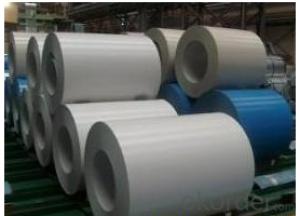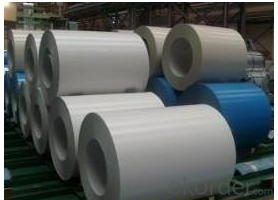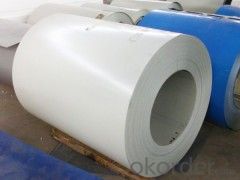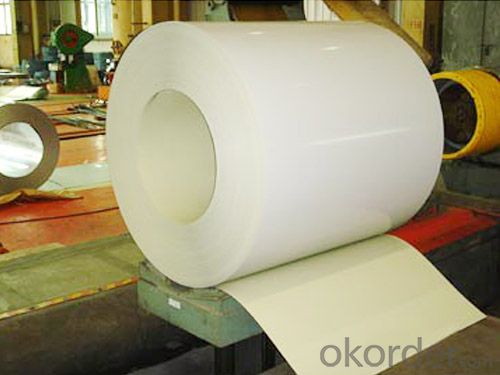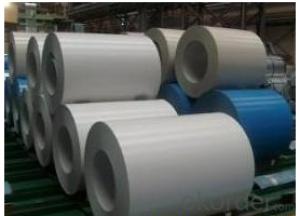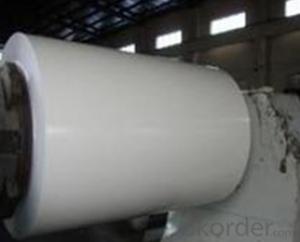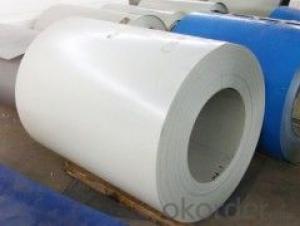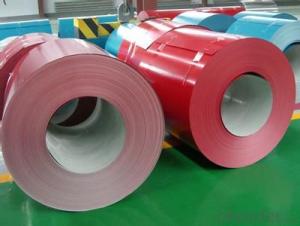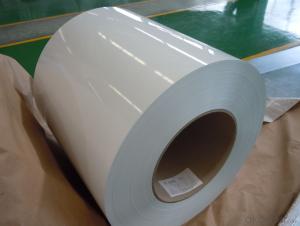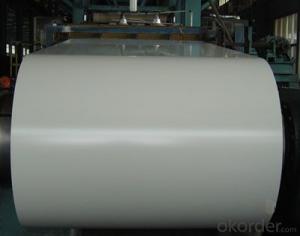Pre-Painted Galvanized Steel Sheet,Coil in Prime Quality White Color
- Loading Port:
- Shanghai
- Payment Terms:
- TT OR LC
- Min Order Qty:
- 200 m.t.
- Supply Capability:
- 10000 m.t./month
OKorder Service Pledge
OKorder Financial Service
You Might Also Like
1. Pre-Painted Galvanized/Aluzinc Steel Coil Description:
With GI as base material, after pretreatment (degrease and chemical treatment ) and liquid dope with several layers of color, then after firing and cooling, finally the plate steel is called pre-painted galvanized (aluzinc) steel. Pre-painted galvanized steel is good capable of decoration, molding, corrosion resistance. It generally displays superior workability, durability and weather resistance.
2.Main Features of the Pre-Painted Galvanized/Aluzinc Steel Coil:
• Excellent process capability
• Smooth and flat surface
• Workability, durability
• Excellent heat resistance performance
• High strength
• Good formability
• Good visual effect
3.Pre-Painted Galvanized/Aluzinc Steel Coil Images
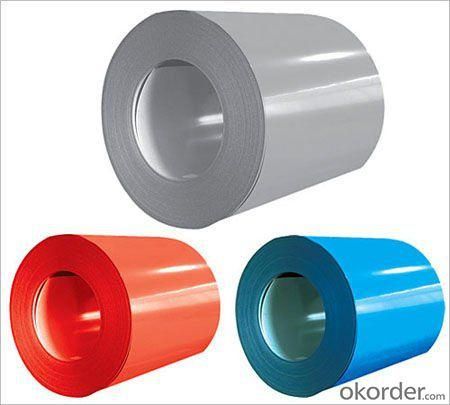
4.Pre-Painted Galvanized/Aluzinc Steel Coil Specification
Standard: AISI, ASTM, BS, DIN, GB, JIS
Grade: DX51D, DX52D
Thickness: 0.17-2.0mm
Brand Name: KMRLON
Model Number: coil
Type: Steel Coil
Technique: Cold Rolled
Surface Treatment: Coated
Application: Boiler Plate
Special Use: High-strength Steel Plate
Width: 20-1250mm
Length: customized
commoidty: pre-painted galvanized steel coil
Thickness: 0.13-4.0mm
width: 20-1250mm
zinc coating: 40-180g/m2
printing thickness: top side: 20+/-5 microns, back side: 5-7 microns
color: all RAL color
surface treatment: color coated
coil weight: 4-7 tons
coil ID: 508/610mm
packaging: standard seaworthy packing
5.FAQ of Pre-Painted Galvanized/Aluzinc Steel Coil
1. What’s the application of this product?
Roof, roof structure, surface sheet of balcony, frame of window, etc.
2. What’s the brand of the paint?
We use the best brand of all of the word—AKZO.
3. How about your company?
A world class manufacturer & supplier of castings forging in carbon steel and alloy steel,is one of the large-scale professional investment casting production bases in China,consisting of both casting foundry forging and machining factory. Annually more than 8000 tons Precision casting and forging parts are exported to markets in Europe,America and Japan. OEM casting and forging service available according to customer’s requirements.
4. How to guarantee the quality of the products?
We have established the international advanced quality management system,every link from raw material to final product we have strict quality test;We resolutely put an end to unqualified products flowing into the market. At the same time, we will provide necessary follow-up service assurance.
5. How long can we receive the product after purchase?
Usually within thirty working days after receiving buyer’s advance payment or LC. We will arrange the factory manufacturing as soon as possible. The cargo readiness usually takes 15-25 days, but the shipment will depend on the vessel situation.
- Q: How are steel coils used in the production of agricultural systems?
- Steel coils are often used in the production of agricultural systems due to their durability and strength. These coils are typically used in the construction of machinery and equipment that are essential in agricultural operations. One common application of steel coils is in the manufacturing of farming machinery such as tractors, plows, and cultivators. These machines require sturdy components to withstand the demanding conditions of the agricultural environment. Steel coils are used to fabricate the frames, chassis, and other structural parts of these machines, providing the necessary strength and support. Steel coils are also used in the production of irrigation systems, which are crucial for efficient water management in agriculture. These coils are utilized in the construction of pipes, valves, and fittings, ensuring the durability and longevity of the irrigation system. Additionally, steel coils are used to manufacture storage tanks and silos, which are essential for storing and preserving agricultural products such as grains, seeds, and fertilizers. Furthermore, steel coils find application in the construction of greenhouses and agricultural buildings. The coils are used to fabricate the structural framework, providing stability and resistance against environmental factors. Steel coils are also used in the production of fencing and enclosures to protect crops and livestock from external threats. In summary, steel coils play a vital role in the production of agricultural systems by providing the necessary strength, durability, and stability required for farming machinery, irrigation systems, storage facilities, and agricultural structures. Their usage ensures that these systems can withstand the demanding conditions of the agricultural industry and contribute to efficient and sustainable farming practices.
- Q: What are the dimensions of steel coils used in the appliance industry?
- The dimensions of steel coils used in the appliance industry can vary depending on the specific application and requirements. However, the most common dimensions for steel coils used in the appliance industry are typically around 0.015 to 0.035 inches (0.38 to 0.89 millimeters) in thickness, 24 to 36 inches (61 to 91 centimeters) in width, and weighing between 1,500 to 10,000 pounds (680 to 4,535 kilograms). These dimensions allow for efficient handling, transportation, and processing of the steel coils in the appliance manufacturing process. It is important to note that these dimensions can vary and should be confirmed with the specific manufacturer or supplier for accurate and up-to-date information.
- Q: What are the different coil leveling machine configurations used for steel coils?
- There are several different coil leveling machine configurations that are commonly used for steel coils. These configurations vary based on the specific requirements of the steel coils being processed. One common configuration is the four-high leveling machine. This machine consists of four leveling rolls arranged in a stack. The steel coil passes through these rolls, which apply pressure to flatten and level the material. The four-high configuration is often used for thicker and heavier steel coils, as it provides a higher level of pressure and control during the leveling process. Another configuration is the six-high leveling machine. This machine has six leveling rolls arranged in two stacks of three rolls each. The steel coil passes through the first stack, where the initial leveling is performed, and then through the second stack for further refinement. The six-high configuration is often used for thinner steel coils, as it allows for a more precise and gentle leveling process. In addition to these configurations, there are also combination leveling machines available. These machines combine leveling with other processes, such as slitting or shearing, to provide a more comprehensive solution for steel coil processing. Combination machines are often used in applications where multiple steps are required to achieve the desired final product. Overall, the choice of coil leveling machine configuration depends on factors such as the thickness and weight of the steel coil, as well as the desired level of precision and efficiency. Manufacturers and processors must carefully evaluate their specific needs and select the appropriate configuration to ensure optimal results in the steel coil leveling process.
- Q: How are steel coils used in the production of metal ceilings?
- Steel coils are an essential component in the production of metal ceilings. These coils, which are typically made of high-quality steel, are used to create the base material for manufacturing metal ceiling panels. The first step in the process involves uncoiling the steel coils and feeding them into a roll forming machine. This machine gradually shapes the steel into the desired profile for the ceiling panels. The coils are passed through a series of rollers, which bend and shape the steel into the required dimensions and design. Once the steel has been shaped, it is then cut into individual panels of the desired length. These panels are then subjected to various finishing processes such as surface treatment, painting, or powder coating to enhance their appearance and durability. Steel coils are preferred in the production of metal ceilings due to their excellent strength and rigidity. They provide a sturdy foundation for the ceiling panels, ensuring their longevity and resistance to deformation. Moreover, steel coils offer superior fire resistance, making them a safe choice for use in commercial and industrial buildings. In addition to their structural benefits, steel coils also allow for a wide range of design possibilities. The malleability of steel allows manufacturers to create intricate patterns and textures on the surface of the ceiling panels, providing aesthetic appeal and enhancing the overall interior design. Overall, steel coils are an integral part of the production process for metal ceilings. They provide the necessary strength, durability, and versatility required for creating high-quality and visually appealing ceiling panels used in various commercial and residential spaces.
- Q: What are the different types of steel coil slitting blades?
- There are several different types of steel coil slitting blades, each designed for specific applications and materials. Some of the most common types include: 1. Circular slitting blades: These are the most commonly used blades for slitting steel coils. They are circular in shape and have a sharp edge that cuts through the coil as it rotates. Circular slitting blades can be made from various materials, such as high-speed steel or tungsten carbide, depending on the desired cutting performance and durability. 2. Arbors: Arbors are another type of steel coil slitting blade that is used in conjunction with circular slitting blades. They are cylindrical in shape and hold the circular blade in place, allowing for precise and consistent slitting of the coil. 3. Shear slitting blades: Shear slitting blades are used for cutting thicker and harder materials, such as stainless steel or aluminum. They have a straight edge and work by shearing the material apart, rather than cutting through it like circular blades. Shear slitting blades are typically made from high-quality tool steel to withstand the high forces involved in cutting thicker materials. 4. Crush cut slitting blades: Crush cut blades are used for slitting softer materials, such as paper or plastic. These blades have a blunt edge that crushes and tears the material, rather than cutting it cleanly. Crush cut blades are often made from materials like carbon steel or hardened stainless steel. 5. Razor slitting blades: Razor slitting blades are used for slitting delicate materials that require a clean and precise cut, such as thin films or foils. These blades have an extremely sharp edge that slices through the material without causing any damage or distortion. Razor slitting blades are typically made from high-quality stainless steel or tungsten carbide. It is important to select the appropriate type of steel coil slitting blade based on the specific application, material, and desired cutting performance. The choice of blade will greatly impact the quality and efficiency of the slitting process.
- Q: What are the different types of steel coil cutting machines?
- There are several different types of steel coil cutting machines available in the market, each designed to cater to specific needs and requirements. Some of the commonly used types include: 1. Slitting Machines: Slitting machines are used to cut steel coils into narrower strips. They have multiple circular blades that make precise cuts along the length of the coil, allowing for the production of narrower coils or strips. 2. Cut-to-Length Machines: Cut-to-length machines are designed to cut steel coils into specific lengths. These machines can accurately measure and cut the coil to the desired length, ensuring uniformity and precision. 3. Rotary Shears: Rotary shears are heavy-duty cutting machines that can handle thicker and larger steel coils. They use a rotating blade to cut through the coil, making it suitable for cutting thicker gauge materials. 4. Multi-Blanking Machines: Multi-blanking machines are designed to cut steel coils into multiple smaller blanks simultaneously. These machines can cut the coil into various shapes and sizes, making them ideal for producing multiple parts from a single coil. 5. Slit and Cut-to-Length Combination Machines: These machines combine the functionalities of slitting and cut-to-length machines, allowing for both narrow strip cutting and length cutting in a single process. They are versatile and efficient, saving time and increasing productivity. Each type of steel coil cutting machine has its own advantages and is suitable for specific applications. The choice of machine depends on factors such as coil thickness, desired strip width, required length accuracy, and production volume.
- Q: like, what can steel make?
- buildings bridges automobiles elevators railroads and railroad equipment appliances and many many more. Steel is used almost everywhere. reference: Iron and steel are used widely in the construction of roads, railways, infrastructure, and buildings. Most large modern structures, such as stadiums and skyscrapers, bridges, and airports, are supported by a steel skeleton. Even those with a concrete structure will employ steel for reinforcing. In addition to widespread use in major appliances and cars (Despite growth in usage of aluminium, it is still the main material for car bodies.), steel is used in a variety of other construction-related applications, such as bolts, nails, and screws.[66] Other common applications include shipbuilding, pipeline transport, mining, offshore construction, pipeline transport, aerospace, white goods (e.g. washing machines), heavy equipment (e.g. bulldozers), office furniture, steel wool, tools, and armour in the form of personal vests or vehicle armour (better known as rolled homogeneous armour in this role). .
- Q: I juuuust got a new stainless steel sink only 5 months ago, and it already has a couple rust spots on it.What caused this?!
- Stainless Steel is the marketing name. For truth in advertising, it should be called Stain Resistant Steel. It should be easy to scrub rust away with an SOS or Brillo pad. To prevent rust from recurring: * thoroughly rinse all chloride containing soaps away * scour the sink at least weekly to remove any residues * if the water source has high mineral content—especially iron—more frequent sink scouring is needed, plus towel drying the sink. * don't allow salt to remain in the sink—rinse it out
- Q: Can steel coils be used in the production of packaging materials?
- Yes, steel coils can be used in the production of packaging materials. Steel coils are often used as the core material for packaging materials such as metal strapping and steel banding. These coils are strong, durable, and provide excellent tensile strength, making them ideal for securing and protecting various products during transportation and storage. Additionally, steel coils can be easily shaped and formed into different packaging components, ensuring a secure and reliable packaging solution for a wide range of industries.
- Q: Well actually I was just wondering why people were bashing on stainless so much for katanas. I heard that they don't hold their edge as well as carbon steel blades or Damascus steel. So what makes it so inferior to carbon or other types of steels?
- Stainless steel is not a go0od material for swords. It tends to shatter. There are many stories about people that have been severely injured or killed because a stainless steel sword shattered. It is simply not worth the risk. ...
Send your message to us
Pre-Painted Galvanized Steel Sheet,Coil in Prime Quality White Color
- Loading Port:
- Shanghai
- Payment Terms:
- TT OR LC
- Min Order Qty:
- 200 m.t.
- Supply Capability:
- 10000 m.t./month
OKorder Service Pledge
OKorder Financial Service
Similar products
Hot products
Hot Searches
Related keywords
